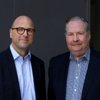Fritextsökning
Artiklar per år
Innehållstyper
-

The International Vaccine Institute’s office in Sweden is expanding
The International Vaccine Institute’s Stockholm office has been open for over a year. During the past year, training programmes and projects have been launched, says Anh Wartel, Head of the office.
-

Anna Törner: The clinical trial – Periscope to reality
What happens to the patients in the clinical trial is not very interesting, writes Anna Törner in a column.
-

Petter Hartman: ”Uppenbart att något måste göras på systemnivå“
Kostnaderna för svensk hälso- och sjukvård har ökat kraftigt de senaste decennierna och prognoserna tyder inte på att något trendbrott är att vänta framöver. Hur ska vi klara finansieringen av framtidens vård? Ett svar på frågan är ökade investeringar i prevention.
-

The Swedish Academy of Sciences: “We have too many researchers”
Sweden does not need more researchers, but it does need better ones. According to the Royal Swedish Academy of Sciences, funding should be distributed to favour excellence.
-

Stort vetenskapligt möte i Stockholm den 8 november
I dagarna är det dags för den elfte årliga upplagan av Life Science Swedens vetenskapliga möte Bioscience i Stockholm. Som deltagare kan du se fram emot en intensiv och berikande dag med aktuella föredrag, givande möten samt gott om tid för nätverkande och besök i utställningen.
-

Founder of Bioarctic, Lars Lannfelt, is honoured: “I want to create something for the future”
It´s like a scientist’s dream: to be the world’s first with a drug that genuinely affects one of our major diseases. Lars Lannfelt and his company Bioarctic have achieved just that, and they are thus making a significant contribution to the history of Swedish medicine. He is now being awarded the Research!Sweden Award 2023.
-

Marie Gårdmark: ”The situation is not satisfactory”
”The legislative tool-box is limited, but carrots in the form of longer exclusivity has already proven successful, this has for example increased registration of new products in rare diseases. But will it also work to increase access for all EU patients?” writes Marie Gårdmark in a column.
-

The Swedish government is to increase its investment in cancer care
The Swedish government wants to invest more in cancer and paediatric cancer care and proposes to allocate SEK 500 million per year for this purpose in the coming years.
-

Why the world renown researcher Marc Tessier-Lavigne resigns as Stanford´s president
In mid-summer, neuroscientist Marc Tessier-Lavigne announced his resignation as President of Stanford following allegations of manipulated study data. According to the reporter Theo Baker, who first reported the story, Tessier-Lavigne “rewarded the winners and punished the losers”. Here is the background of the story which has shaken the American scientific community over the summer.
-

Lucy Robertshaw: Artificial intelligence – is this really going to transform a patient’s life?
In a column Lucy Robertshaw reflects on how AI and new regulations will affect healthcare, innovation and the lives of future patients.
-

Samuel Lagercrantz: The government’s performance in healthcare and life sciences so far
Since the change of government in Sweden, developments in the healthcare sector have shown promising signs, but the outlook in life sciences is less promising, writes Samuel Lagercrantz in an editorial.
-

Study: Chat GPT is more empathetic than doctors
The AI tool Chat GPT is not only more accurate when it comes to answering patient questions – the chatbot is also perceived as almost 10 times more empathetic than real doctors, a new study reveals.
-

Looking for greater Nordic cooperation – “We have Norway and Finland in our sights”
How can Medicon Valley Alliance bring the big pharmaceutical companies back to the organisation? Life Science Sweden discussed this topic and others with the cluster organisation’s new radar pair.
-

”Vi vill inte ha rättvisa”
Det handlar inte om rättvisa, målet är inte 50 procent kvinnor i styrelser och bolagsledningar för att det ska vara rättvist, utan för att vi har så mycket att bidra med. Det finns kunskaper och infallsvinklar där vi kvinnor är starkare och kan bidra med andra perspektiv och bättre beslut. Tillsammans blir vi starkare, skriver Anna Törner i en debattartikel.
-

Chat GPT mer empatisk än läkare enligt studie
Chat GPT har inte bara större precision när det kommer till patientfrågor – chattboten uppfattas dessutom som nästan tio gånger mer empatisk än riktiga läkare, enligt en ny studie.
-

KI’s new President: “We need to work closer together”
A closer link between research and education and a stronger “we-feeling” are aims that Annika Östman Wernerson sets out to achieve as the new President of Karolinska Institutet. She will not give up her research entirely though. “I think it’s crucial to maintain a close presence in the business,” she says.
-

“I am driven by the desire to develop a product that can be sold worldwide”
Ranked number one in the world by the WHO in diarrhoea research and soon in phase III studies for its vaccine candidate – Scandinavian Biopharma is rushing forward in the pursuit of the world’s first ETEC vaccine. Meet the company’s CEO Björn Sjöstrand.
-

Column: ”Cheating with pea flowers and does it matter whether you are right?”
Is it possible to forgive shortcuts or outright cheating in science - if it turns out that the researcher was ultimately right? Anna Törner discuss this topic in a column.
-

The Swedish National Board of Health and Welfare rejects prioritising andrology as a speciality
Male infertility can be linked to a shorter lifespan and several severe diseases, but when couples who want children are examined, the focus is on the woman. Experts in the field claim that andrology needs to become a speciality in Sweden to increase awareness and knowledge. But the Swedish National Board of Health and Welfare says that it is not a priority.
-

Socialstyrelsen vill inte prioritera andrologi som specialitet
Manlig infertilitet kan hänga ihop med kortare livslängd och flera allvarliga sjukdomar, men när par som vill ha barn utreds ligger fokus på kvinnan. Experter inom området vill att andrologi nu ska bli en specialitet – men enligt Socialstyrelsen är det inte prioriterat.
-

Kan TBY-robotar bli ett tillskott till arsenalen inom precisionsmedicin?
Forskare från Kina presenterar i februarinumret av Science Advances en ny metod för målinriktad behandling vid inflammatorisk tarmsjukdom: en TBY-robot. En viktig komponent i roboten är jäst – samma sort som används för att ta fram en god öl, eller baka bröd, för den som föredrar det.
-

Editorial: ”AI that both impresses and frightens”
”In the past, I've rarely been particularly impressed by something that was produced by AI. But this is something completely different”, Samuel Lagercrantz writes in an editorial.
-

Precision medicine centre: “Extensive activity on several fronts”
Two years ago, the Karolinska Institutet and the Karolinska University Hospital announced that they would jointly launch the Precision Medicine Centre. Medtech Magazine called Anna Wedell, who is heading the work, to find out…
-

Hög aktivitet på Precisionsmedicinskt centrum
För två år sedan meddelade Karolinska institutet och Karolinska universitetssjukhuset att de tillsammans skulle sjösätta Precisionsmedicinskt centrum. Medtech Magazine ringde upp Anna Wedell, som leder arbetet, för att ta reda på…